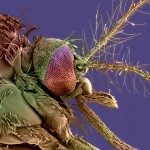Lien vers Pubmed [PMID] – 10572663
Bull Soc Pathol Exot 1999 Sep-Oct;92(4):266-73
The transmission of pathogens by arthropods is dependent on the relationships that exist between the pathogen, the invertebrate host (the vector) and the vertebrate host, each of which is influenced by environmental variations. Particular attention is given to the knowledge of intrinsic factors and the mechanisms controlling the ability of vectors to transmit pathogens (viruses or parasites). Polymorphism in the expression of susceptibility to oral infection has been shown to occur among geographical samples of mosquitoes. It has been proven that intraspecific variations in vector competence are controlled by one or more genes and expressed in variable proportions within a mosquito population. Recent advances in molecular biology have facilitated accessibility of nucleic acid sequence data. These new techniques allow one to analyse the genotype distribution within and among populations. Population genetic studies are currently used to understand the evolution of species differentiation and provide indications on genetic relationship among field vector populations. Estimations of gene flow with respect to vector capacity have provided rich insight into vector species complexes. Knowledge of intraspecies variation is important for the understanding of vector transmission, disease epidemiology and disease control. In this article, two examples are presented to illustrate the contribution of population genetic studies to the understanding of epidemiology of arthropod-borne diseases: Aedes polyneniensis, a vector of human lymphatic filariasis and Aedes aegypti, the vector of dengue viruses.

